
January 17
1887 Monty is born:
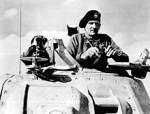
On this day in 1887, Bernard Law Montgomery, British general and one of the most formidable Allied commanders of the war, as well as one of the most disliked, is born in London.
A graduate of the Royal Military Academy at Sandhurst, Montgomery fought in World War I with distinction, leading an infantry platoon in an attack at Ypres, Belgium, the site of three major battles and many British casualties. Between wars, Montgomery stayed in the army as an instructor, rising in reputation as a tough-minded leader.
During the Second World War, Montgomery took command of the 3rd Army Division as part of the British Expeditionary forces in France, but had to be evacuated at Dunkirk. Two years later, in August 1942, Prime Minister Winston Churchill gave Montgomery command of the British 8th Army, which had been pushed across North Africa into Egypt by German General Erwin Rommel. Needless to say, British morale was low-but not for long. "We will stand and fight here. If we can't stay here alive, then let us stay here dead," Monty declared in his typical braggadocio style, and proceeded to push Rommel into retreat at the Battle of el-Alamein—all the way to Tunisia. Rommel was finally recalled to Europe, and the Germans surrendered their position in North Africa altogether in May 1943.
It was during preparations for Operation Overlord, the D-Day invasion of France, that Montgomery's prickly personality ran straight into Gen. Dwight Eisenhower, supreme commander of the operation. Montgomery and his 21st Army Group performed admirably in France, keeping the Germans turned in one direction as American forces attacked from the other. But Eisenhower often rejected many of Monty's strategic proposals, deeming them overly cautious (he was unwilling to move until all the resources and men necessary for optimum results were in place). Ike also thought Montgomery unable and unwilling to strain every last bit of advantage from every strategic gain.
Monty, for his part, did little to hide a haughty disdain for Eisenhower-not to mention his desire to take complete control of land forces. After receiving the surrender of the German northern armies in 1945, Monty held a press conference in which he all but took credit for salvaging a disintegrating American-led operation. He was almost removed from his command for this outrageous, and groundless, contention. By war's end, virtually no American commanding officer, including Generals Omar Bradley and George Patton, was speaking to Montgomery.
After the war, Monty was made a viscount and a knight of the garter. Among the offices he held was deputy commander of the North Atlantic Treaty Organization (NATO), Supreme Headquarters, Allied Powers in Europe. He also went on to write a number of treatises on warfare, as well as his Memoirs (1958). He died in 1976 at the age of 88. He would be remembered as one of the most gifted British commanders of the war-but more by his troops than by his American counterparts. (History.com)
1893 Hawaii: Americans overthrow the monarchy:
On the Hawaiian Islands, a group of American sugar planters under Sanford Ballard Dole overthrow Queen Liliuokalani, the Hawaiian monarch, and establish a new provincial government with Dole as president. The coup occurred with the foreknowledge of John L. Stevens, the U.S. minister to Hawaii, and 300 U.S. Marines from the U.S. cruiser Boston were called to Hawaii, allegedly to protect American lives . . . .
In 1898, the Spanish-American War broke out, and the strategic use of the naval base at Pearl Harbor during the war convinced Congress to approve formal annexation. Two years later, Hawaii was organized into a formal U.S. territory and in 1959 entered the United States as the 50th state. [For further details, Click here.]
1904 Austria: DAP (German Workers Party): The first issue of the party's newspaper appears. (THP) [See: Austria: The Other Germany.]
1914 World War I: Germans make last stab at Ypres:
On November 17, 1914, the German 15th Corps makes a final, desperate attempt to advance against Allied positions in the Ypres Salient, the much-contested region in Flanders, Belgium.
After advancing relatively quickly through Belgium and eastern France during the first weeks of World War I, the Germans were defeated by the Allies in late September 1914 in the Battle of the Marne. The two enemies then began the so-called "Race to the Sea," moving northwards at a hectic pace in order to establish positions with access to the English Channel and the North Sea beyond. On October 19, the Germans launched an offensive aimed at seizing control of Ypres—the fortress city blocking the ports of the English Channel in Flanders—from the British, French and Belgian forces guarding it. For their part, the Allies held fast in their resistance, knowing a defeat would mean the loss of a crucial advantage.
On the last day of October, German cavalry units began a more concentrated attack, kicking the First Battle of Ypres into high gear. Over the next three weeks, the chaotic nature of the fighting only increased its bloody nature, with casualty figures on both sides mounting as the weather grew colder and more blustery. The attempt by the 15th Corps on November 17—which Allied forces repulsed—marked the last movement of the battle, as the Germans thereafter confined themselves to intermittent cannon blasts against the Allied lines. Five days later, amid high winds and blizzards, fighting was suspended completely, and the First Battle of Ypres came to an end after taking the lives of more than 5,000 British and 5,000 German soldiers. (History.com)
1916 World War I: Winston Churchill hears speech on the tragedy of war:
Winston Churchill, beginning his service as a battalion commander on the Western Front, attends a lecture on the Battle of Loos given by his friend, Colonel Tom Holland, in the Belgian town of Hazebrouck.
The Battle of Loos, which took place in September 1915, resulted in devastating casualties for the Allies and was taken by the British as a sign of the need to change their conduct of the war. In one major consequence, Sir John French was replaced by Sir Douglas Haig as British commander in the wake of that battle.
Tom spoke very well, Churchill wrote to his wife, Clementine, but his tale was one of hopeless failure, of sublime heroism utterly wasted and of splendid Scottish soldiers shorn away in vain with never the ghost of a chance of success. Afterwards they asked me what was the lesson of the lecture. I restrained an impulse to reply Don't do it again'. But they will—I have no doubt.
Churchill had been demoted from First Lord of the Admiralty after the British plan to attempt a naval capture of the Turkish-controlled Dardanelle Straits met with resounding failure in mid-to-late-1915. Reduced to a minor ministerial position, Churchill resigned from the government in November 1915 and rejoined the army, heading to the Western Front with the rank of lieutenant colonel.
During his six months in Belgium, the young Churchill—who would later lead his country to victory in the Second World War and be celebrated as the greatest political leader in British history—saw first-hand the hardships of war and the sacrifices that unknown, unheralded soldiers made for their country. More than once, he himself narrowly escaped death by an enemy shell. As he wrote to Clementine, Twenty yards more to the left and no more tangles to unravel, no more anxieties to face, no more hatreds and injustices to encountera good ending to a chequered life, a final gift—unvalued—to an ungrateful country. (History.com)
1918 World War I: Gefreiter Adolf Hitler's 16th RIR [List Regiment] is pulled off the front lines for a well-deserved rest. Balthaser Brandmayer will write:
What a wonderful time! Misery and need are quickly forgotten. Anxiety and fear, through the long war years, have become unknown conceptions. So the visits each day of aviators dropping bombs does not disrupt in the least our royal Bavarian rest . . . . [I received a letter from my girlfriend] Hitler saw this and asked in a good-humored tone: "Brandmoari, has Trutschnelda written again?" Good guess," I retorted. "Have you never wanted a girl?" I asked. "Look Brandmoari, I've never found time for such a thing," Hitler replied. "And I don't want to," he continued. "You're a strange one, Adi! I'll never understand you," I replied. "There's no hope for you." . . .
[Another time someone said] "How would it be if I found a mam'selle for us?" . . . "I'd kill myself from shame rather than make love to a French woman", Hitler leapt excitedly into the discussion. The effect of the moment was raucous laughter. "Listen to the monk!" cried one. Hitler's face became serious. "Don't any of you feel your honor as a German any more?" [For further details, Click here.]
1935 Saarland: The League of Nations formally awards the region to Germany.
1937 Kiel Canal: Germany prohibits free passage to foreign warships:

The Kiel Canal: until 1948 known as the Kaiser-Wilhelm-Kanal, is a 61 miles (98 kilometres) long canal . . . that links the North Sea at Brunsbuettel to the Baltic Sea at Kiel-Holtenau. An average of 250 nautical miles (460 kilometers) is saved by using the Kiel Canal instead of going around the Jutland Peninsula. This not only saves time but also avoids potentially dangerous storm-prone seas . . . . After World War I, the Treaty of Versailles internationalised the canal while leaving it under German administration . . . . Adolf Hitler repudiated its international status in 1936.
1939 Various:
World War II: Denmark, Latvia and Estonia sign a non-aggression pact with Germany. Norway, Sweden and Finland insist on strict neutrality.
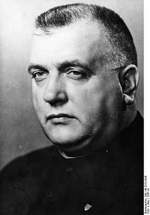
Holocaust: Slovakia: Father Tiso (Premier) declares that his foremost task is to solve the 'Jewish question.' (THP)
Holocaust: Reich Citizenship Act:The eighth ordinance is passed, barring Jewish dentists, veterinarians and chemists from practicing their professions. Jewish dentists may only treat Jewish patients. (THP)
1940 Church and Reich: From a letter written by Bormann, to Reichsleiter Rosenberg
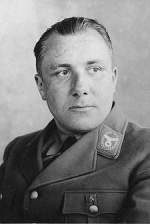
Nearly all the districts (Gaue) report to me regularly that the churches of both confessions are as active as ever in ministering spiritually to members of the Armed Forces. This finds expression especially in the fact that soldiers are being sent religious publications by the pastors of their home parishes. These publications are, in part, very well written. I have repeated reports that these publications are being read by the troops and thereby exercise a certain influence on their morale. I have at that time sought, by contacting at once the General Field Marshal, the High Command of the Armed Forces, and Party Member Reichsleiter Amann, to restrict considerably the production and shipment of publications of this type. The result of these efforts remained unsatisfactory. As Reichsleiter Amann has repeatedly informed me, the restriction of these pamphlets by means of the paper rationing cannot be achieved because the paper used for the pamphlets is being purchased on the open market. If the influencing of the soldiers by the Church is to be effectively combated, this will be accomplished only by producing many good publications in the shortest possible time under the supervision of the Party. Also, at the last meeting of the Deputy Gauleiter comments were made on this matter to the effect that such publications are not available in sufficient quantities. I maintain that it is necessary that in the very near future we transmit to the Party Service Offices, down to the Ortsgruppenleiter, a list of additional publications of this sort which should be sent to our soldiers by the Ortsgruppen.
1942 Various:

Death: Field Marshal Walther von Reichenau:
Walter von Reichenau, the son of a Prussian general, was born in Germany on 16th August, 1884. He joined the German Army when he was eighteen and in 1904 became an officer in the 1st Guards Field Artillery Regiment. In May 1914 entered the War Academy in Berlin where he underwent General Staff training. On the outbreak of the First World War he was sent to the Western Front . . . . he won the Iron Cross, and by 1918 had reached the rank of captain.
After the war, Reichenau was a General Staff officer with the Wehrkries VI (1920-22) before serving as commander of the 8th Machine Gun Company. He was promoted to major in 1923 and joined the Wehrkries III in Berlin . . . .
In February 1931, Reichenau was named Chief of Staff of Wehrkries I in East Prussia, where he served under General Werner von Blomberg. Reichenau's uncle, Friedrich von Reichenau, was an ardent supporter of the Nazi Party and, in 1932, he introduced his nephew to Adolf Hitler. Reichenau was immediately converted and soon afterwards he arranged for Blomberg to meet Hitler.
When Hitler gained power in January 1933 . . . Reichenau was appointed head of the Ministerial Office of the Reichswehr Ministry. Reichenau now became chief liaison officer between the German Army and the Nazi Party . . . . In 1933 Werner von Blomberg and Reichenau became increasingly concerned about the growing power of the Sturm Abteilung (SA) . . . . Senior officers in the German Army were angry about the growth in power of the SA and Reichenau began to fear the possibility of a military coup against Hitler. If this happened Reichenau's career would be over. He therefore conspired with Hermann Goering and Heinrich Himmler against Roehm and the SA . . . .
In August 1935, Reichenau was promoted to lieutenant general and was appointed commander of Wehrkries VII in Munich. The following year he was appointed general of artillery and in 1938 Adolf Hitler wanted to appoint him as Commander-in-Chief of the Army. Leading figures in the German Army complained and Gerd von Rundstedt, Franz Halder and Ludwig Beck all refused to serve under him. Hitler was forced to change his mind and on 4th February, 1938, General Heinrich von Brauchitsch was appointed instead . . . .
In September 1939, Reichenau commanded the 10th Army for the invasion of Poland. The following year he led the 6th Army during the Western Offensive in Belgium and France. On 19th July, 1940, Hitler promoted him to field marshal.
Reichenau, a strong opponent of an invasion of the Soviet Union, also took part in Operation Barbarossa during the summer of 1941. Leading the 6th Army his troops managed to capture Kiev, Belgorod, Kharkov and Kursk. Reichenau encouraged his soldiers to commit atrocities against the Jews in the territory under his control. On one occasion he told his men: "We have to exact a harsh but just retribution on the Jewish subhumans . . . . "
In November 1941, Hitler decided to replace Field Marshal Heinrich von Brauchitsch as Commander-in-Chief of the Army. Reichenau's name was suggested but Hitler rejected the idea saying that he was "too political".
The campaign in the Soviet Union came to a halt during the winter of 1941. Field Marshal von Rundstedt, commander of Army Group South, asked permission to retreat to the Mius River. When Hitler rejected the idea, Rundstedt resigned. On 30th November, Hitler replaced [Rundstedt with Reichenau]. The following day Reichenau ordered a withdrawal to the Mius River and then sent a note telling Hitler what he had done.
In an attempt to keep fit, Reichenau used to go on a daily cross-country run. On 12th January, 1942, he ran several miles in temperatures well below minus 20 degrees Fahrenheit. When he returned, he complained of feeling unwell and later that day he had a severe heart attack. After [he had been] unconscious for five days it was decided to fly him back to Germany. Walter von Reichenau died on 17th January 1942, when the plane carrying him to Leipzig crash-landed.
World War II: Winston Churchill is nearly shot down by the enemy and then his own air force. Returning from the US, his flying boat veers off course and comes far too close to German antiaircraft guns in France. After this error is noticed and corrected, his aircraft then appears to British radar operators to be an enemy bomber. Six RAF fighters are scrambled but they failed to find him.
1943 Stalingrad: Rokossovsky wants a pause of 2-3 days in the attacks, so that he can regroup. The attacks continue, however. By this stage conditions within the pocket are becoming increasingly grave. Food is desperately short. This and the extreme cold inflict the defenders with ever greater lethargy. It is now hardly possible to evacuate the wounded, and many of them die. Nonetheless there are still enough officers and men who are determined to fight on.
1944 World War II: Various:
Italy: Allies make their move on Cassino:
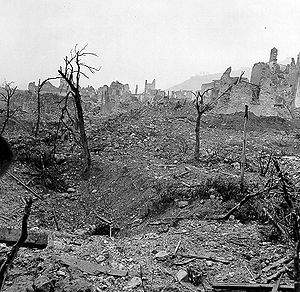
On this day, Operation Panther, the Allied invasion of Cassino, in central Italy, is launched.
The Italian Campaign had been underway for more than six months. Beginning with the invasion of Sicily, the Allies had been fighting their way up the Italian peninsula against German resistance—the Italians had already surrendered and signed an armistice with the Allies in September 1943. The ancient town of Cassino, near the Rapido River, was a strategic point in the German Gustav Line, a defensive front across central Italy . . . . Taking Cassino would mean a breach in the German line and their inevitable retreat farther north.
Although the campaign to take Cassino commenced in January, the town was not safely in Allied hands until May. The campaign caused considerable destruction, including the bombing of the ancient Benedictine abbey Monte Cassino, which took the lives of a bishop and several monks.
War at Sea: A Heinkel 177 sights convoy OS65/KMS39. Of the U-boats directed to the scene, only U-641 gets near on the 19th of January and is sunk by the corvette Violet.
1945 World War II: Various:
Warsaw was a battleground since the opening day of fighting in the European theater. Germany declared war by launching an air raid on September 1, 1939 . . . . In August 1944, the Soviets began pushing the Germans west, advancing on Warsaw. The Polish Home Army, fearful that the Soviets would march on Warsaw to battle the Germans and never leave the capital, led an uprising against the German occupiers. The Polish residents hoped that if they could defeat the Germans themselves, the Allies would help install the Polish anticommunist government-in-exile after the war. Unfortunately, the Soviets, rather than aiding the Polish uprising, which they encouraged in the name of beating back their common enemy, stood idly by and watched as the Germans slaughtered the Poles and sent survivors to concentration camps. This destroyed any native Polish resistance to a pro-Soviet communist government, an essential part of Stalin's postwar territorial designs. [See: The Last Days of the Third Reich.]

Much has been written to explain the initial Soviet collapse and the great subsequent rally. For example, it has been argued that the Germans defeated themselves. Their beastly treatment of the Soviet population—documented in A. Dallin's study and in other works—turned friends into enemies. It has even been claimed that to win the war the Nazis had merely to arm Soviet citizens and let them fight against their own government, but Hitler was extremely reluctant to try that. The Russian Liberation Army of Andrew Vlasov, a Soviet general who had been taken prisoner by the Germans and had proceeded to organize an anti-Communist movement, received no chance to develop and prove itself in combat until it was too late. Commentators have also rightly stressed the importance of the Soviet appeal to patriotism and other traditional values.
The Communist government consciously utilized the prestige of Russian military heroes of the past and the manifold attractions of nationalism. It emphasized discipline and rank in the army, reducing the power of the commissars. Concurrently it made concessions to the practice of religion and spoke of a new and better life which would follow the end of the war. The Russians, it has been maintained, proved ready to die for their country and that new life, while they felt only hostility to the Soviet regime. These and other similar explanation of the Soviet turnabout and of the German defeat appear to contain much truth. Yet, in the last analysis, they might give as one-sided a picture of the Soviet scene as the wholesale admiration of the Soviet regime and its virtues popular during and immediately after the war in less critical Western circles. The salient fact remains that in one way or another Stalin and his system prevailed over extreme adversity.
Holocaust: A Jewish uprising breaks out at Chelmno (Kulmhof) in Poland. The last 47 Jewish slave laborers, knowing they are about to be shot by the SS, take refuge in a building as Soviet troops draw nearer. The SS sets fire to the building and machine-guns those who attempt to escape the flames. Only one prisoner survives. (THP)
Holocaust: Auschwitz: The SS records a total of more than 30,000 slave laborers still in the Auschwitz region.
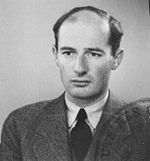
Holocaust: Raoul Wallenberg: Swedish diplomat , credited with saving tens of thousands of Jews from the Nazis, is arrested by Soviet secret police, as they arrived in Hungary. He is never seen again by the outside world. [For further details, Click here.]
1946 Various:
Nuremberg Tribunal: Day 36 of the trial: France presents its case against Germany: M. Francois De Menthon (Chief Prosecutor for the French Republic):
The conscience of the peoples, who only yesterday were enslaved and tortured both in soul and body, calls upon you to judge and to condemn the most monstrous attempt at domination and barbarism of all times, both in the persons of some of those who bear the chief responsibility and in the collective groups and organizations which were the essential instruments of their crimes. France, invaded twice in 30 years in the course of wars, both of which were launched by German imperialism, bore almost alone in May and June 1940 the weight of armaments accumulated by Nazi Germany over a period of years in a spirit of aggression. Although temporarily crushed by superiority in numbers, material, and preparation, my country never gave up the battle.
United Nations: The Security Council, the organ of the United Nations charged with the maintenance of international peace and security, holds its first meeting at Church House in London. [For further information, click here.]
1949 Volkswagen: The first Beetle arrives in the US.
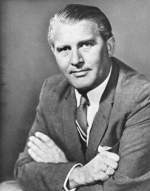
1959 President Eisenhower presents Werner von Braun, Hitler's former lead rocket scientist now working for the US, with a Distinguished Federal Service Medal, the highest award given to civil servants. Von Braun uses the opportunity, with Eisenhower standing nearby, to tell the press that the ABMA in Huntsville could use another 50 to 60 million dollars. The fiscally conservative Eisenhower successfully resists the suggestion. (Piszkiewicz) [See: Wunderwaffen: Hitler's Deception and the History of Rocketry.]
1961 Eisenhower bids farewell:

On January 17, 1961, in a nationally televised speech, Dwight D. Eisenhower addresses the American people for the last time as president. Expressing ideas that seem prophetic in retrospect, Eisenhower offered his fears and hopes for the future, warning against the unfettered growth of the "military-industrial complex," as he coined it, and calling for diplomacy, restraint, and compassion in dealing with future crises with the Soviet Union. Despite his sadness that peace was not in sight, the great Allied commander offered a closing prayer to the world from America. "We pray," he said, "that people of all faiths, all races, all nations...will come to live together in a peace guaranteed by the binding force of mutual respect and love."
Three days later, Eisenhower left the White House and retired with his wife, Mamie, to their farm in Gettysburg, Pennsylvania, their permanent home until Eisenhower's death on March 28, 1969. The couple had been fond of sitting on their back porch, which looked east toward the famous Civil War battlefield. (History.com) [For the full text of the speech, Click here.]
1966 Nuclear weapon lost in Spain:
On this day, a B-52 bomber collides with a KC-135 jet tanker over Spain's Mediterranean coast, dropping three 70-kiloton hydrogen bombs near the town of Palomares and one in the sea. It was not the first or last accident involving American nuclear bombs.
As a means of maintaining first-strike capability during the Cold War, U.S. bombers laden with nuclear weapons circled the earth ceaselessly for decades. In a military operation of this magnitude, it was inevitable that accidents would occur. The Pentagon admits to more than three-dozen accidents in which bombers either crashed or caught fire on the runway, resulting in nuclear contamination from a damaged or destroyed bomb and/or the loss of a nuclear weapon. One of the only "Broken Arrows" to receive widespread publicity occurred on January 17, 1966, when a B-52 bomber crashed into a KC-135 jet tanker over Spain.
Edited by Levi Bookin (Copy editor)
levi.bookin@gmail.com



Click to join 3rdReichStudies

FAIR USE NOTICE: This site may contain copyrighted material the use of which has not always been specifically authorized by the copyright owner. We are making such material available in our efforts to advance understanding of historical, political, human rights, economic, democracy, scientific, environmental, and social justice issues, etc. We believe this constitutes a 'fair use' of any such copyrighted material as provided for in section 107 of the US Copyright Law. In accordance with Title 17 U.S.C. Section 107, the material on this site is distributed without profit to those who have expressed a prior interest in receiving the included information for research and educational purposes. If you wish to use copyrighted material from this site for purposes of your own that go beyond 'fair use', you must obtain permission from the copyright owner.
Please note that the list-owner and the moderators are not responsible for, and do not necessarily approve of, the random ads placed on our pages by our web server. They are, unfortunately, the price one pays for a 'free' website.